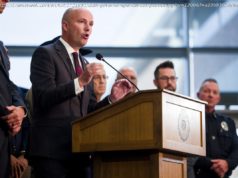Analysts say closure of the site is important, but it doesn’t represent a material step toward full denuclearization.
SEOUL, South Korea — North Korea said Saturday that it will dismantle its nuclear test site in less than two weeks, in a dramatic event that would set up leader Kim Jong Un’s summit with President Trump next month.
In a statement carried by state media, North Korea’s Foreign Ministry said that all of the tunnels at the country’s northeastern testing ground will be destroyed by explosion, and that observation and research facilities and ground-based guard units will also be removed.
Kim had already revealed plans to shut down the test site by the end of May during his summit with South Korean President Moon Jae-in last month. Analysts say that while the closure of the site is important, it doesn’t represent a material step toward full denuclearization.
“A ceremony for dismantling the nuclear test ground is now scheduled between May 23 and 25,” depending on weather conditions, the Foreign Ministry’s statement said.
It said the North will invite journalists from the United States, South Korea, China, Russia and Britain to witness the dismantling process.
The journalists will be provided with a charter flight from Beijing to the North Korean coastal city of Wonsan, from where they will travel by train to the test site, the statement said.
The ministry said the North will continue to “promote close contacts and dialogue with the neighboring countries and the international society so as to safeguard peace and stability on the Korean Peninsula and over the globe.”
Following the Moon-Kim summit, Moon’s office said Kim was willing to disclose the process to international experts, but the North’s statement Saturday didn’t include any mention about allowing experts on the site.
The North’s statement comes days after Washington announced that the historic summit between Kim and Trump will be held June 12 in Singapore.
Seoul, which shuttled between Washington and Pyongyang to set up the Trump-Kim meeting, has said Kim has genuine interest in dealing away his nuclear weapons in return for economic benefits. However, there are lingering doubts about whether Kim would ever agree to fully relinquish the weapons he likely views as his only guarantee of survival.
During their summit at a border truce village, Moon and Kim vaguely promised to work toward the “complete denuclearization” of the Korean Peninsula, but made no references to verification or timetables.
North Korea for decades has been pushing a concept of “denuclearization” that bears no resemblance to the American definition. The North has been vowing to pursue nuclear development unless Washington removes its 28,500 troops from South Korea and the nuclear umbrella defending South Korea and Japan.
Some experts believe Kim may try to drag out the process to wait out the Trump administration or seek a deal in which he gives away his intercontinental ballistic missiles but retains some of his shorter-range arsenal in return for a reduced U. S. military presence in the South. This could satisfy Trump but undermine the alliance between Washington and Seoul.
Kim declared his nuclear force complete in December, after North Korea’s most powerful nuclear test to date in September and three flight tests of ICBMs designed to reach the U. S. mainland.
North Korea said at a ruling party meeting last month that it was suspending all tests of nuclear devices and ICBMs, as well as the plan to close the nuclear testing ground.
Kim said that the nuclear test site’s mission had come “to an end” because the North had completed the process of developing nuclear-capable intermediate-range missiles, ICBMs and other weapons.
The North also said for the first time at the meeting that it had been conducting “subcritical” nuclear tests. These refer to experiments involving a subcritical mass of nuclear materials that allow scientists to examine the performance and safety of weapons without triggering a nuclear chain reaction and explosion.
Send questions/comments to the editors.






